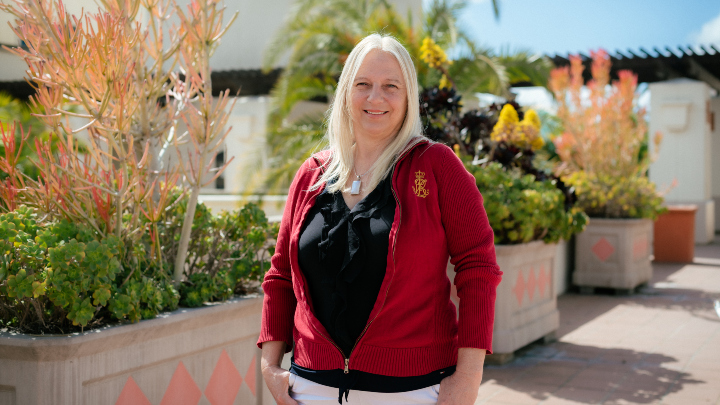Mary Baker-Ericzén Earns Top Research Honor

For Mary Baker-Ericzén, being a community-based service researcher means never quite knowing where her next avenue of exploration will lead. An expert in services to support autistic teens and adults, she works collaboratively with the autism community to center their needs and priorities.
“I don't come up with an idea that I think is a good idea or that just follows my path of prior research,” said Baker-Ericzén, a research professor in San Diego State University’s Department of Administration, Rehabilitation and Postsecondary Education (ARPE) since 2021. “I have to change course at any time to follow what the community says.”
If that sounds challenging, it is. But there’s never a dull moment.
"I've never once felt bored," says with a laugh.
Baker-Ericzén’s eclectic, community-focused research recently garnered recognition from the San Diego State University Division of Research and Innovation. She has been selected as the Non-Tenure Track Faculty Outstanding RSCA awardee — an honor that was bestowed upon her at the Albert W. Johnson Award Ceremony on March 13.
A diverse portfolio
The disparate, ever-shifting nature of Baker-Ericzén’s research to address the needs of the autism community is on display in her recent projects.
Last fall, she earned press for her work with a Vanderbilt University team to develop an artificial-intelligence based driving simulator to help autistic adults to safely get behind the wheel. Baker-Ericzén, who developed the behavioral strategy-based intervention to help individuals utilize the tool, explains she never intended to tackle driving.
“I was pursuing research in enhancing employment,” she recalls. “Right as we started down that pathway, the community immediately came back and said, ‘Yes, but transportation is a barrier to employment that needs to be addressed. Even if we’re able to get jobs, we can’t get to them.’
“So I had to take on another research direction.”
Baker-Ericzén — who will tell you she’s no techie — is now collaborating with University of Michigan researchers on a project to use artificial intelligence-informed virtual reality systems to give neurodiverse teens and adults a safe environment for practicing job interview skills.
Other initiatives include a collaboration with Portland State University on a measurement development project to give the neurodiverse community more say in the desired outcomes of services, as well as a project to develop an intervention to enhance executive functioning skills in teens and pre-teens.
Added significance
Baker-Ericzén calls the RSCA honor one that she is proud to share with all those who make her research possible, including neurodiverse self-advocates, family members, service providers, educators and other researchers.
She also said it was particularly heartening to receive the universitywide research honor as a community-based services researcher.
“I think a lot of times, when our research fields go up against other disciplines, we sometimes are not viewed as rigorous research — which is not the case,” Baker-Ericzén said. “So I feel extra thrilled that community services research in disability has risen in recognition across the university.”

